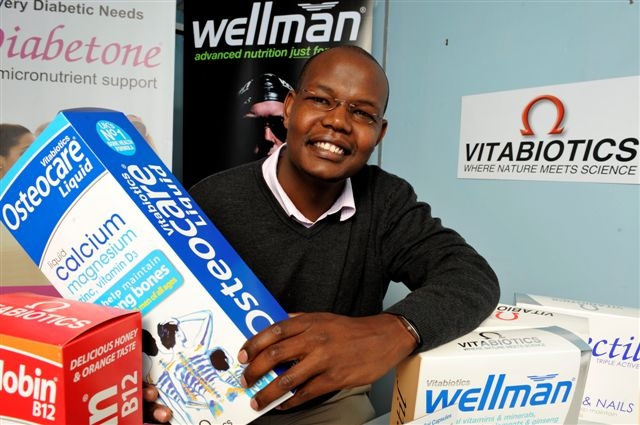By KC Rottok | wednesday, 07 march 2012 16:02
“Given the challenges you face as an entrepreneur, I think it is equally important to sharpen your emotional IQ as you would with business expertise!”
I was first introduced to the name Dr. Chomba Chuma when it appeared in my inbox in 2007 inviting me to a presentation on South African property. A few days later I joined a small group that had come to listen to the owner of Mumbi Properties explain how to use trusts to create a property portfolio.
“I named the company Mumbi after my late sister,” he informed me when we met recently.
“I got the idea of forming the company when I had acquired my fourth property in the country and needed a vehicle to manage them. I figured that as my portfolio grew so would the company. Unfortunately we hit a rough patch when the recession hit in 2008 but things are slowly getting back on track.”
Chomba was drawn to property investment because it allowed him to develop the passive income the industry promised by way of rentals and capital growth. The bulk of his time is taken up by his position as the Managing Director of Vitabiotics South Africa, a company he co-owns following a decision to venture into the business world after a career as a medical doctor.
“I ended up as a doctor due to the Kenyan education system,” he explained with a slight frown. “When I got good grades the system kind of dictated that I pursue either pharmacy or medicine. I pursued the latter at Moi University and on completion of my studies and internship I joined the Swiss pharmaceutical giant Roche. Six months later they posted me to Johannesburg as the medical director for Sub Saharan Africa.”
Chuma believes that moving with his wife Rispah whom he met in medical school made the transition less difficult. He worked for two years at the company before joining Sanofi Aventis as a national sales manager for a blood thinner. While at Sanofi, he established his own company called Lighthouse Pharma selling supplements through Dischem and independent courier pharmacies.
“In 2006, after a year at Sanofi, I felt that my company was doing well enough for me to take a leap of faith and run it on a full time basis,” he recalled, this time with a smile. “We were able to get more products into the Dischem chain of pharmacies and in 2008 we decided to make our company bigger by selling a majority stake to our suppliers Vitabiotics UK.”
When asked whether the move to full time business was easy, his frown returned as he explained with an air of seriousness what the trying times have taught him.
“I think one should go to a school of psychology rather than a business college when contemplating becoming an entrepreneur,” he advised. “I did a business diploma and later pursued an MBA which I thought would equip me for the challenges ahead. Well, that doesn’t prepare you mentally to be tough when sales are slow and you have to pay salaries.”
The biggest challenge that Vitabiotics faced was that of distribution. Chomba revealed that to get a product like Immunace to a place like Upington by courier costs more than the product itself. Hence it was a big break for the company when their products were approved for distribution through Clicks which has about 400 stores and 280 pharmacies nationally.
“That was a new beginning for us,” he beamed.
And speaking of new beginnings, I asked Chomba about a new association he has been at the forefront of founding known as the Kenyan Diaspora Association of South Africa (KEDASA).
“We had a meeting in May to form the association as an umbrella body for the many different Kenyan groups that exist in South Africa. The inaugural office bearers are drawn from these groups and so far we have presented our views to President Mwai Kibaki in Pretoria, hosted the Commission for the Implementation of the Constitution (CIC) and I represented the association at the meeting of Kenyan Ambassadors held in Mombasa.”
At the time of the interview, the association was also working on a plan to mobilise assistance for Kenyans who have been affected by the ongoing drought in East Africa.
“The association has a draft constitution largely borrowed from a similar association for Kenyans in Holland,” Chomba explained continued. “It will guide the membership and leadership structure as well as establish a continuous process for raising funds to make it self-sufficient. It is important that the organisation unlike the many that came before it outlives its interim office bearers.”
Conscious of the many organisations that have previously represented Kenyans in SA, I ask Chomba what makes KEDASA different.
“Being an umbrella body means that we essentially have corporate members including a number of churches, Prokey, KESABA, student bodies, KEFA and the Upendo Women’s Investments Group. Our approach is different seeing as we are not competing with these organisations but rather inviting them to participate in a collaborative effort. If you consider the success of the CIC meeting, belonging to an umbrella body facilitates communication as the different bodies bring in their members for each project.”
Chomba is a 36 year old father of two; daughter Lerato and son Tsepo. His plan is to establish a few companies in SA over the next decade that can run themselves without his involvement then return to Kenya to participate in national development.
Article available online – http://www.expatriate.co.za/index.php/articles/38-profiles/124-kc-rottok.html

